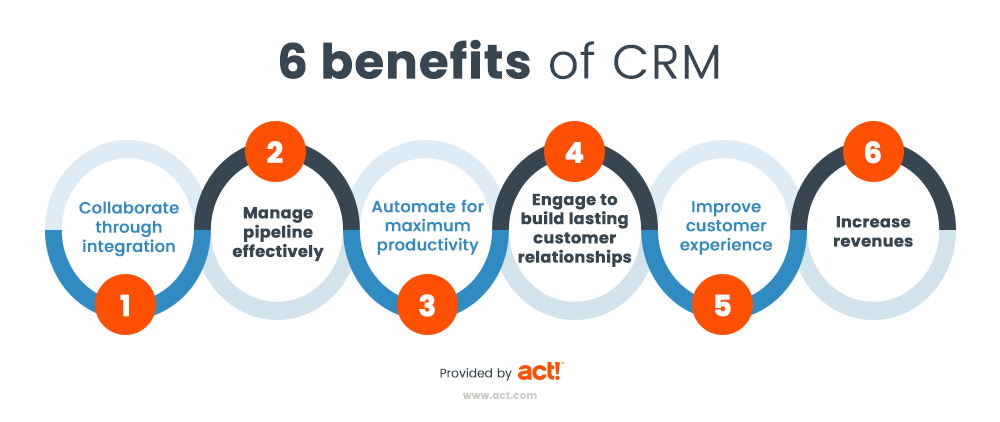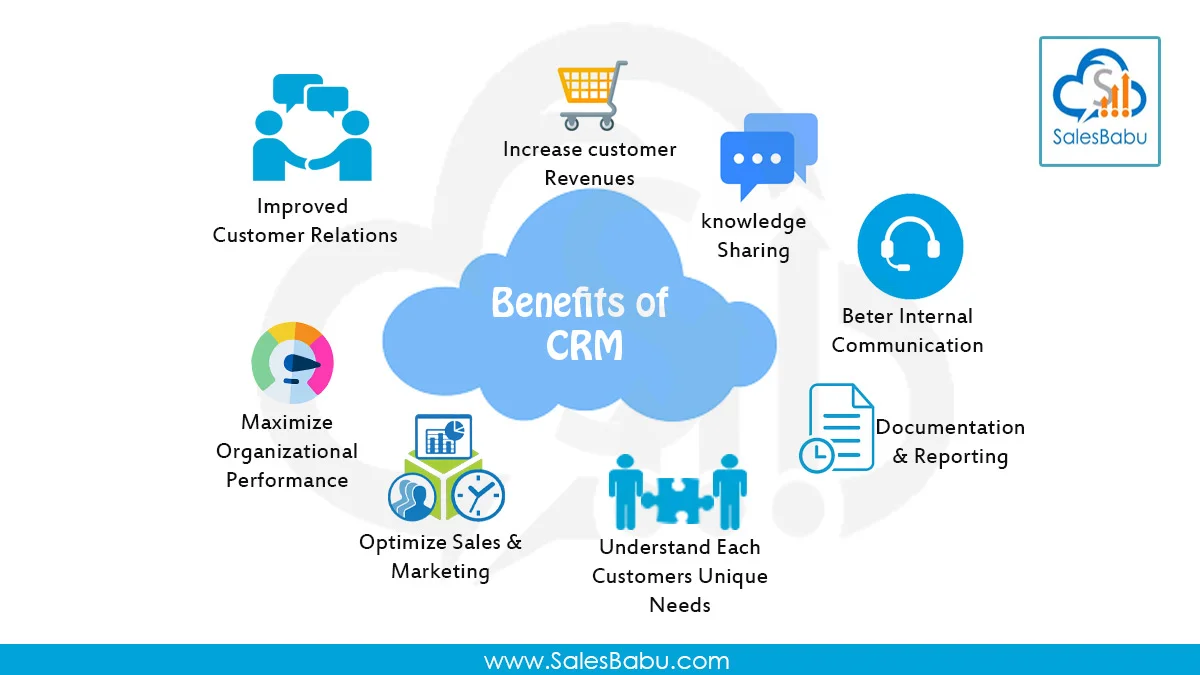In the rapidly evolving business landscape, the seamless operation and efficient management of customer interactions have emerged as critical competitive differentiators. The implementation of Customer Relationship Management (CRM) systems has taken center stage in this regard, empowering businesses with the tools to nurture relationships, optimize processes, and drive growth. This article delves into the multifaceted benefits of implementing a CRM system, illuminating how it can revolutionize the way businesses engage with their customers and achieve unprecedented success.
What Are the Benefits of Implementing a CRM System?
Improved Customer Relationships
A CRM system can help you improve your customer relationships by providing you with a centralized view of all your customer interactions. This includes their purchase history, communication history, and any other relevant information. This allows you to:
- Personalize your interactions with customers, which can lead to increased satisfaction and loyalty.
- Identify and address customer needs more effectively, leading to higher retention rates.
- Build stronger relationships with your customers by providing them with a more personalized and consistent experience.
| Benefit | Description |
|---|---|
| Personalized Interactions | CRM systems allow you to track customer preferences and tailor your communication and marketing efforts to individual needs. |
| Customer Needs Identification | By analyzing customer data, you can identify pain points and opportunities for improvement, leading to better products and services. |
| Stronger Relationships | Consistent and personalized interactions foster trust and loyalty, leading to long-term customer relationships. |
Increased Sales and Revenue
A CRM system can help you increase your sales and revenue by providing you with the tools you need to:
- Identify and target potential customers more effectively.
- Close deals faster by streamlining your sales process.
- Increase average order value by recommending relevant products and services to customers.
| Benefit | Description |
|---|---|
| Targeted Marketing | CRM systems enable you to segment your customer base and target specific groups with relevant marketing campaigns. |
| Streamlined Sales Process | Automated tasks and workflows optimize sales operations, allowing sales teams to focus on high-value activities. |
| Increased Order Value | By understanding customer preferences, CRM systems can recommend relevant products and services, leading to higher order values. |
Improved Efficiency and Productivity
A CRM system can help you improve your efficiency and productivity by:
- Automating repetitive tasks, such as data entry and follow-up emails.
- Centralizing information, so you can easily access all the data you need to make informed decisions.
- Improving communication and collaboration among team members.
| Benefit | Description |
|---|---|
| Task Automation | CRM systems automate routine tasks, freeing up valuable time for more strategic activities. |
| Centralized Data | Access to all customer data in one place, eliminating the need to search across multiple systems. |
| Enhanced Collaboration | Shared access to information and communication tools improve collaboration and streamline workflows. |
Boosting Business Growth and Efficiency: The Power of CRM
Improved Customer Relationships
Implementing a CRM system allows businesses to centralize and organize all customer data in one place, providing a comprehensive view of each customer’s interactions. This enables businesses to build stronger relationships by understanding customer needs, preferences, and purchase history. By leveraging this information, businesses can personalize communications, offer tailored solutions, and provide exceptional customer experiences.
Enhanced Sales Performance
CRM systems empower sales teams to streamline their processes and increase productivity. Sales automation features, such as lead management, opportunity tracking, and sales forecasting, provide valuable insights and tools to identify potential leads, prioritize opportunities, and optimize sales strategies. By automating repetitive tasks and providing real-time data, CRM systems help sales teams close deals faster and achieve higher conversion rates.
Increased Customer Retention
By fostering strong customer relationships, CRM systems play a crucial role in customer retention. By understanding customer preferences, businesses can anticipate their needs, provide proactive support, and offer personalized recommendations. CRM systems also facilitate targeted marketing campaigns and customer loyalty programs, further strengthening customer relationships and encouraging repeat business.
Improved Marketing Effectiveness
CRM systems empower businesses to create more effective marketing campaigns by providing valuable customer insights. By segmenting customers based on demographics, interests, and purchasing behavior, businesses can tailor marketing messages and deliver relevant content through targeted channels. This personalized approach enhances campaign effectiveness, increases engagement, and drives conversions.
Streamlined Operations and Efficiency
CRM systems streamline business operations by automating tasks, improving data management, and eliminating redundancies. By centralizing customer information, businesses can reduce data silos and ensure consistent communication across departments. This streamlined approach improves efficiency, reduces errors, and frees up time for employees to focus on strategic tasks.
Frequent questions
What is a CRM system, and why should I implement one?
A CRM system, or Customer Relationship Management system, is a software application that helps businesses manage and track interactions with their customers. It is a powerful tool that can help businesses streamline their operations, improve customer satisfaction, and increase revenue. Implementing a CRM system can provide numerous benefits, including:
- Centralized customer data: A CRM system can consolidate all customer information in one central location, making it easier for businesses to access and share data across departments.
- Improved customer service: With access to comprehensive customer data, businesses can provide more personalized and efficient customer service.
- Enhanced sales productivity: CRM systems can automate tasks such as lead generation, tracking sales opportunities, and managing pipelines, allowing sales teams to focus on closing deals.
- Increased customer retention: By understanding customer needs and preferences, businesses can develop targeted marketing campaigns and provide personalized experiences that enhance customer loyalty.
- Better decision making: CRM systems provide valuable insights into customer behavior and trends, enabling businesses to make more informed decisions about their operations.
What are the key features of a CRM system?
A comprehensive CRM system typically includes features that address various aspects of customer relationship management, including:
- Contact management: This feature allows businesses to store and manage customer information, such as names, addresses, phone numbers, and email addresses.
- Sales management: This feature helps businesses track sales opportunities, manage pipelines, and forecast sales revenue.
- Marketing automation: This feature enables businesses to automate marketing tasks, such as email campaigns, social media posts, and website content.
- Customer support: This feature helps businesses manage customer inquiries, track support tickets, and provide timely resolution to issues.
- Reporting and analytics: This feature provides insights into customer behavior, sales performance, and other key metrics, allowing businesses to make data-driven decisions.
How can I choose the right CRM system for my business?
Choosing the right CRM system depends on your specific business needs and requirements. Consider the following factors:
- Industry: Some CRM systems are tailored to specific industries, such as healthcare, finance, or retail.
- Business size: The size of your business will influence the features and functionality you need in a CRM system.
- Budget: CRM systems come in various price ranges, so it’s important to consider your budget constraints.
- Integration capabilities: Ensure that the CRM system you choose can integrate with your existing software applications, such as your email marketing platform or accounting software.
- User-friendliness: Choose a system that is easy to use and navigate for your team.
What are the challenges of implementing a CRM system?
Implementing a CRM system can be a complex process and can present certain challenges, including:
- Data migration: Moving existing customer data to a new CRM system can be time-consuming and challenging.
- User adoption: Ensuring that employees adopt and use the CRM system effectively requires proper training and support.
- Customization: Adapting the CRM system to your specific business processes and workflows may require customization, which can be expensive and time-consuming.
- Integration with other systems: Integrating the CRM system with other software applications can be complex and require technical expertise.
- Return on investment: Measuring the return on investment of a CRM system can be difficult, as the benefits are not always immediately apparent.



